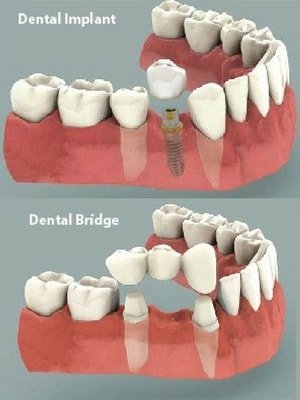Should I get a dental bridge or dental implant?
A very common question to ask yourself while planning to get teeth replacements. Extracted or missing teeth can pose the risk of infection, but a quality replacement is key to a healthy, beautiful smile.
Missing tooth/teeth can affect the way your jaw functions, your digestion, facial appearance, general health, and self-esteem. The gaps between the teeth allow the adjacent teeth to drift in the unoccupied spaces, leading to issues with bite alignment that may have some serious implications in the form of joint pains (MPDS, TMD). It is thus, essential to get a proper replacement of a missing tooth to keep the rest of your teeth aligned. Two of the most common options are dental bridges and implants.

A dental implant is an individual unit (titanium screw) without any support of the adjacent teeth, whereas a dental bridge has an artificial tooth held in place by the support of adjacent teeth.
Placing a dental implant at the site of a missing tooth preserves healthy adjacent teeth which is not the case with a dental bridge. The adjacent teeth in a dental bridge need a fair amount of grinding and may sometimes require an intentional root canal treatment.
A dental implant would have nearly the same chewing efficacy as a natural tooth whereas the force of chewing reduces when a dental bridge replaces a missing tooth.
Lastly, a dental implant supports jaw health. The surrounding bone is not only preserved but there is also stimulation of natural bone growth around the implant. In the case of a dental bridge, the root of the missing tooth is not replaced. This causes the underlying bone to degenerate more quickly.
To summarise, dental implant-supported teeth can be considered to be the next best alternative to a natural tooth in most circumstances. They offer more lasting protection than dental bridges.
However, feel free to contact Indiadens to discuss your preferences and concerns. We would be glad to guide you in taking the best decision for yourself.












